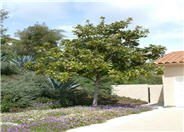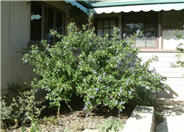
Common name:Star Jasmine, Maile Haole
Botanical name:Trachelospermum jasminoides
The Star Jasmine is an evergreen vine that grows 20' tall or as a groundcover that reaches 1'-2' tall and 4'-5' wide. It has white fragrant flowers in the summer and can tolerate sun or partial shade. The Star Jasmine is also drought tolerant. -Cornflower Farms

Common name:Southern Magnolia, Bull Bay
Botanical name:Magnolia grandiflora
Its large, simple, leathery appearance makes the pyramidal Magnolia grandiflora perfect for either a street or lawn tree. Its leaves are 4"-8" long, and its powerfully fragrant blooms are carried throughout the summer. Reddish brown cone shaped fruit appear in the fall. If these plants are grafted, they are more predictable (may take 15 years to bloom). Ungrafted trees will take only 2-3 years. Restricted root areas or heavy soils will slow the growth process.

Common name:Hybrid Tea Rose (selections)
Botanical name:Rosa Hybrid Tea varieties
These shrubs and vines are the most loved in the Western USA and are very resilient. They come in a wide variety of sizes and colors and are easy to maintain with proper care. They can be used in a water-conserving garden with careful attention to irrigation practices.

Common name:Iceberg Floribunda Rose
Botanical name:Rosa 'Iceberg'
This is a shrub rose (there are climbing varieties) with an abundance of fragrant, medium sized, white blooms. It is one of the most popular roses and very tough.

Common name:Ray Hartman California Lilac
Botanical name:Ceanothus 'Ray Hartman'
Growing vigorously as either a large shrub or small tree, the Ray Hartman has big leaves and medium blue, delicate flowers in 3"-5" clusters. It grows to 12' high and 8'-10' wide. This cultivar has good tolerance for heat; it needs occasional deep waterings with good drainage. It attracts hummingbirds, butterflies and beneficial insects. - Cornflower Farms
| Designer: Anon | Corner Wall |
Photographer: GardenSoft |
Soils and Compost:
Physical weed control, including mulching, or hand removal protects the watershed from harmful chemicals.
Water Saving Tip:
Check your irrigation controller once a month, and adjust as necessary.
Most plants require only one-third as much water in winter as they do in summer.
Integrated Pest Management:
Develop healthy soil for plants that are vigorous and naturally pest-resistant.
